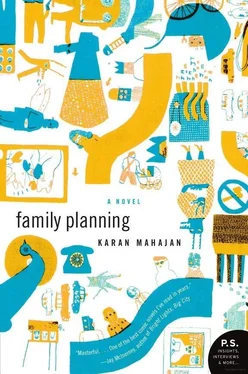But the unplugged guitarists improvised. Somehow Anurag and Deepak were able to match the twanging of their bass and rhythm, and now Arjun started to croak and he closed his eyes and the chords clicked into place — and he couldn’t do it. He couldn’t bring himself to imagine Aarti and the song at once. When he sang, he lost Aarti. The small, quiet, dark room made him self-conscious, as if he were singing into a wall of judging listeners. As if he were in a tomb, in a womb, trying to scream his way out.
“I can’t sing in such a small space,” he admitted, speaking into the wall. He licked the wallpaper sensually.
The band members approved of his histrionics.
“Man, that’s good,” said Ravi. “Like whatshisname — Jim Morrison? Kiss?”
“You can even wear mascara.”
“No, I really can’t sing,” Arjun insisted.
Mrs. Mehta — Ravi’s mother — tended to agree. “What are you children doing?” she asked, stepping into the room. “All the neighbors are calling me and asking things? Please do not be doing this. Here are five hundred rupees, go to the market and do your no-good lazy thuggery over there.”
And they did, though not without an air of dejection. Their first practice had failed. They ate ice cream and ogled girls in GK Market. Arjun felt a little relieved that no one had pinned the band’s failure on his complete inability to sing. As they walked through the market, he expressed his deep desire to scream and the impossibility of viscerally exercising his talent in the company of such mean neighbors. He extolled the virtues of dressing in a tight white T-shirt and jeans (which he would procure for all them, of course). He spoke at length about his vision for the band, an intersection of traditional Indian values (conveyed lyrically) with a distinctly American tradition associated with Bryan Adams (conveyed through tight jeans).
“But he’s a fucking Canadian, you fool,” said Ravi.
Arjun looked at Ravi and replied solemnly: “We need a better place to practice.”
They were sitting in Barista, sipping cold coffees animated with whirling clouds of sugar. Somehow they had lost track of the hours, whiling them away playing video games in United Arcade and putting their feet up on tables at all the new coffee shops that had opened up in GK.
Ravi said, “How about your house? You have a big garden. Your electricity never goes. Your dad gives speeches there — so there must be amps. We can also go on your roof. If there’s noise we’ll go acoustic.”
All this was true, but Arjun wanted to say: the problems are numerous too. To begin with, he had always maintained that he had only six siblings, not twelve. Using a special route through the house — one that took him past the kitchen, with its constant screech of mixies and pressure cookers, and wound around the nursery — he could prevent his friends from noticing at least five of his brothers and sisters who’d be bangled around the TV in Mama’s room, playing on the old, outdated Mega-Drive video console. But then: the cluster of toothbrushes in the bathroom. The elongated 12 x 30 family photos on the wall. The fifteen table-mats on the table. The shoe rack that was more shoe than rack. The skyscrapers of folded laundry on the peninsular outcropping of the ironing board. The guest bedroom stuffed with pyramids of toilet paper and ointments and tampons and plastic-wrapped diapers and old-fashioned airtight jars containing Lifebuoy Soap, flaxseeds, roasted garlic cloves, gond gum, mango preserves, Parle G biscuits — a history of Mama’s cravings. It wasn’t worth the risk. He hadn’t invited his friends to his house in years .
And then there was Shankar, that nosy, boisterous servant who existed in an oscillating state of being-fired and quitting, of being drunk and sober, of being playful and interfering, so on, so forth, ad infinitum . The last time he was fired, he had written a letter to Mrs. Ahuja — that torturer of servants — saying that he hoped he was reborn as a dog in the Ahuja household, because a dog, he suspected, would be treated better than a servant (he was right). Luckily, Mr. Ahuja got his hands on this letter as well, took pity on the poor man whose handwriting was smudged from the very-same rains that had destroyed his house in Ranikhet (so he claimed), leaving him with nothing, only the cell phone he had once purchased in installments, which in any case was no good in the Himalayas, where he had tried calling from (he claimed) before writing this letter about the prospects of life as a dog in the Ahuja household . The point was, Shankar had a strange hold on everyone. He was a season, returning always, fiercer than before, globally warmed by the TV in the kitchen. He had an opinion on everything. He insisted on humming, for instance, the Offspring song “Pretty Fly for a White Guy,” which he had heard Arjun play on repeat. This awful cooption — this humming by a man who had no idea what the song was about (nor did Arjun, he thought it was about a prettily designed zipper on a pant) — was acceptable only because no one else knew the song.
Arjun himself was humming the song. He nodded vaguely at Ravi and wondered what everyone was doing at home. It was already five in the evening. Arjun was almost never away from the house this long without permission (even though he was sixteen! Sixteen!); he burned with pride as he imagined his parents’ anxiety, their desperate calls to his friends’ homes.
Or maybe, he realized, they wouldn’t notice he was missing.
It was perfectly plausible in a house with thirteen children.
“So?” said Ravi. “Your house?”
“I’ll ask my Dad,” said Arjun.
CHAPTER 10. MR. AHUJA RIGS THE POLLS
MR. AHUJA HAD NOT IGNORED Arjun’s rock band. He couldn’t ignore it. He had followed Arjun to the threshold of the nursery and lost him for the second time in one day. He reached down and lifted up baby Vikram from his crib, held him to his shoulder, burps and all, and was aware suddenly of the immense distance — the strained ropes of time and space — that separated him from his youngest child, the sheer number of intervening boys and girls whom he’d birthed to undertake — in effect — the bidding of the father, their years of training at child rearing slowly cutting away the cumulative minutes Rakesh spent changing Vikram’s diapers and coochy-cooing on his knees beside the crib. The issues at the top — Arjun, for example — could keep one busy forever. To plunge through the system was to feel, at times, like one’s intelligence was being wasted, that a command once given or a lesson once taught would automatically transmit itself in gathering concentration, like DDT in the human body or wealth in an economy or each-one-in-a-teach-one, to the underprivileged voiceless baby. What was a baby but a multi-limbed package of stimuli? What was a baby compared to Rita’s first period or Varun’s attempt to set fire to the front garden or Sahil’s discovery that the Coke was so adulterated it tasted of ink? What was he doing kissing his baby when he ought to be talking to Arjun?
The thought — its strains of cost-benefit analysis — made him feel disgusted.
“I’m going to tell Arjun about his mother today,” he said, not turning around to face Mrs. Ahuja, “when he comes back.”
“Good,” she said.
Mr. Ahuja said, “Good? Good? You don’t believe me or what?”
“I do,” said Mrs. Ahuja. “I believe.”
But Mr. Ahuja knew she didn’t. He had used the threat of telling Arjun the secret some one hundred forty-five times in their marriage.
“Then?” Mr. Ahuja said.
“Haan-ji?”
“That’s all?”
Читать дальше












